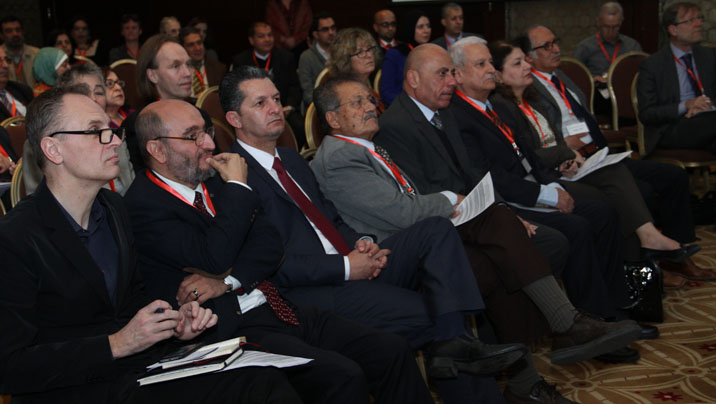On March 10 2016, and immediately following the seventh annual 2017 Lancet Palestinian Health Alliance (LPHA) conference convened on March 7-8 2016 in Amman, a special LPHA policy workshop was held at Birzeit University. The session was organized by the Institute of Community and Public Health (ICPH) in collaboration with the LPHA. It aimed to engage speakers who had presented in this and previous LPHA conferences, panelists with experience in health and health care in the oPt, and the professional and practice audience attending the session in a discussion of how to link research results to policies and interventions. Special focus was given to two themes: Non-communicable diseases and evidence based actions. Presentations and discussions built on knowledge accumulated internationally and through research undertaken in the oPt, as well as on Palestinian experiences of what works and what does not work, and why.
The opening of the workshop included welcoming remarks from Dr. Abdullatif Abu Hijleh, President of Birzeit University; Dr. Niveen Abu Rmeileh, Director of the Institute of Community and Public Health at Birzeit University, and an LPHA Steering Group member. The first session entitled: ‘From research to policy and links to the global health debate” was moderated by Dr. Mamdouh Aker, President of the Palestinian Policy Forum and member of the LPHA Steering Group. Dr. Aker elaborated on the rationale for the LPHA activities and its framework. Speaking on behalf of the chair of the LPHA Steering Group, Professor Graham Watt from Glasgow University who could not attend the workshop, Dr. Niveen Abu Rmeileh summarized the 2016 LPHA Conference findings. Mr. Tony Laurance from Medical Aid for Palestinians focused on how to move from research to policies and practices; and Dr. Richard Horton, the Chief Editor of the Lancet, ended the session following excellent discussions with a presentation on how to synchronize and synergize Palestinian needs with the global health platform.
The second session included two sequential discussion panels, one focusing on non-communicable diseases, and the other on evidence based actions. The discussions were moderated by Dr. Abdullatif Husseini from Qatar University and Dr. Rana Khatib from the Welfare Association oPt, both members of the LPHA Steering Group. Panelists responding to talking points and questions posed by the moderators and the audience included professionals from the Palestinian Ministry of Health, officials of UNRWA in the West Bank and WHO in the West Bank and Gaza Strip, the Palestinian Legislative Council, Maqassed Hospital, and academics from Al Quds University, Islamic University in Gaza, and Birzeit University. Dr. Richard Horton concluded the day’s activities by summarizing findings and providing direction for future actions.
